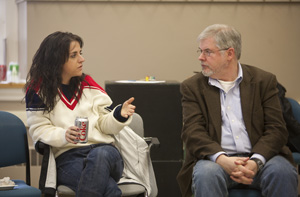Notice of Online Archive
This page is no longer being updated and remains online for informational and historical purposes only. The information is accurate as of the last page update.
For questions about page contents, contact the Communications Division.
 Lafayette College Theater’s presentation of Pulitzer Prize winner David Mamet’s Oleanna will be presented 8 p.m. Feb. 11-12 and 3 p.m. Feb. 13 in the Williams Center for the Arts Black Box Theater. Tickets are free and available at the Williams Center box office at (610) 330-5009.
Lafayette College Theater’s presentation of Pulitzer Prize winner David Mamet’s Oleanna will be presented 8 p.m. Feb. 11-12 and 3 p.m. Feb. 13 in the Williams Center for the Arts Black Box Theater. Tickets are free and available at the Williams Center box office at (610) 330-5009.
English major Elizabeth Witmer ’10 (Santa Barbara, Calif.) is directing the play as part of her senior honors project. Michael O’Neill, associate professor of English and director of theater, is serving as Witmer’s faculty adviser.
“As a director, my goal is to engage the community for which this piece will be performed,” says Witmer. “The setting of the piece, a professor’s office, and the characters in the piece, a professor and student, are familiar and relatable to the audience in which the play will be performed–the Lafayette community. Oleanna provides the audience with a sense of truth, although I have found that an individual’s understanding of the play varies. I want people to walk away from this production contemplating their understanding of the piece and why their ‘truth’ may be different from the people sitting next to them.”
First performed off-Broadway in 1995, Oleanna is one of Mamet’s most controversial works, exploring the themes of sexual harassment and gender politics. The two-character play focuses on the power struggle between John, a university professor, and Carol, one of his female students who accuses him of sexual exploitation and, by doing so, spoils his chances of getting tenure. Biochemistry Brett Billings ’12 (Marion, Kan.) will perform the role of John, and international affairs major Rachel Ports ’10 (Baltimore, Md.) will play Carol.
“I’ve always been attracted to Mamet’s work because of the dialogue he creates for the characters he’s portraying,” says Witmer. “Mamet once described his dialogue ‘a poetic reinstatement of the way people talk.’ I believe that what we see in the theater should be a poetic reinstatement of how we live. Given the conflict that arises throughout Oleanna and observing the play as a reinstatement of how we live, there is a lot we can learn about how we as human beings have become accustomed to interacting with one another.”
Categorized in: Academic News
 Lafayette College Theater’s presentation of Pulitzer Prize winner David Mamet’s Oleanna will be presented 8 p.m. Feb. 11-12 and 3 p.m. Feb. 13 in the Williams Center for the Arts Black Box Theater. Tickets are free and available at the Williams Center box office at (610) 330-5009.
Lafayette College Theater’s presentation of Pulitzer Prize winner David Mamet’s Oleanna will be presented 8 p.m. Feb. 11-12 and 3 p.m. Feb. 13 in the Williams Center for the Arts Black Box Theater. Tickets are free and available at the Williams Center box office at (610) 330-5009.